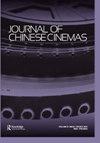Identity dismissed: Hong Kong leftist cinema of the 1950s
IF 0.4
3区 艺术学
0 FILM, RADIO, TELEVISION
引用次数: 0
Abstract
AbstractThere has been a reconstitution of a ‘local’ identity in opposition to leftist politics in articulating recent pro-democratic activist movements in Hong Kong. In light of this context, this article examines this historical formation through the lens of using Hong Kong leftist cinema of the 1950s, especially productions from the Union Film Studio, as a case study. Through focusing on some key examples from the Hong Kong Cantonese leftist cinema of the 1950s, this paper traces the historical construction of a politicized ethical consciousness in Hong Kong poignant throughout the 1950s but became increasingly marginalized from the mid-1960s on. It argues that the class and gender analysis that post-war filmmakers made of colonial capitalism needs to be re-read in relation to a form of Chinese anti-imperial patriotism heavily marked by traumatized historical feelings from feudal, colonial and wartime experiences, driven by an emotional need for an idealized community through identifying with the underclass and the dispossessed. It proposes a reconsideration of Hong Kong’s cultural and film histories through mapping the development of this politicized film discourse which has inherited the rich tradition of Shanghai leftist cinema while fueled with an anti-colonial, anti-capitalist ethic to effectively respond to the post-war Chinese refugee-dominated society. This article problematizes the often taken-for-granted meanings and values of a Hong Kong ‘local’ identity defined as opposed to those of Mainland China, serving to perpetuate the Cold War binarism, and argues that the successful neoliberalization of Hong Kong from the 1970s on is a result of the collaborative efforts among the PRC ‘extreme left’ during the Cultural Revolution, globalized Cold War forces, KMT cultural-political demands from Taiwan, and British colonial polices, not without irony.Keywords: Sinophone cinemasHong Kong film historyHong Kong local identity and cultural politicsBritish colonial modernityCold War Disclosure statementNo potential conflict of interest was reported by the author(s).Notes1 This article is revised from a paper presented at the “Neomoralism Under Neoliberalism International Conference,” held at Lingnan University in Hong Kong in 2014.The paper draft was first translated by Ernest Fung from Chinese, then revised and shortened significantly by Yau Ching for this journal issue. I would like to particularly acknowledge the support from the reviewers whose suggestions and comments have made this paper more sound and coherent. Special thanks to Natalia Chan Lokfung in helping to confirm citations.2 I use “leftist” and “left-wing” inter-changeably in this article. Although they might have different connotations according to context, these terms refer to a community of public cultural workers with pro-socialist identifications and values in the historical context studied in this article. Likewise, “rightist,” “right-leaning” and “right-wing” for the opposite camp.3 Liao Chengzhi (1908-1983), head of the Overseas Chinese Commission and Minister of the Office of Overseas Chinese Affairs, was “the Communist Party’s specialist on Taiwan and the chief negotiator in talks with Britain on the future of Hong Kong…” http://www.nytimes.com/1983/06/11/obituaries/liao- chengzhi-75-a-chinese-leader.html4 This plot may be partly inspired by Crows and Sparrows (1949, Zheng Junli). I am indebted to one of the reviewers who made this suggestion, yet a comparison of the two films is beyond the scope of this paper.5 Adapted from “Un pour tous! Tous pour un!” from Alexandre Dumas’ The Three Musketeers which Lin Shu (1852-1924) translated as “All for one and one for all.”6 What must be emphasized, though, is that the hope in a literati-dominant nationalism has always been second skin in Union Film productions. For example, in Sworn Sisters, the person who rescues everyone from their predicament is Ah Ying (played by Tsi Lo-lin), the only literate person amongst them. At the end of the film a God-like voiceover also reminds the audience to judge the actions of the domestic workers.7 On Christmas Day, 1953, a massive fire swept the Shek Kip Mei squatter area and made 53,000 people homeless overnight.8 The complex relationship between colonial modernity, capitalism and Christianity needs to be rendered in greater depth with much more research than the scope of this paper would allow.Additional informationNotes on contributorsChing YauChing Yau is a writer, filmmaker and scholar from Hong Kong. She currently teaches at the National Central University, Taiwan. More information is available at www.yauching.com.身份被抛弃:1950年代的香港左派电影
摘要在香港最近的亲民主运动中,有一种“本地”身份的重构,以反对左翼政治。在此背景下,本文以20世纪50年代香港左派电影,特别是联合电影制片厂的作品为个案,考察这一历史形成。本文以五十年代香港粤语左派电影中的一些重要案例为重点,追溯了香港政治伦理意识在五十年代的历史建构,这种意识在五十年代是尖锐的,但从六十年代中期开始逐渐被边缘化。它认为,战后电影人对殖民资本主义的阶级和性别分析,需要与中国反帝国主义的一种形式重新解读,这种形式的爱国主义在很大程度上以封建、殖民和战争经历的创伤历史情感为特征,被一种通过认同下层阶级和被剥夺者而对理想化社区的情感需求所驱动。它通过描绘这种政治化电影话语的发展,提出了对香港文化和电影历史的重新思考,这种话语继承了上海左派电影的丰富传统,同时以反殖民、反资本主义的伦理为动力,有效地回应了战后中国难民主导的社会。本文对香港“本地”身份的定义(与中国大陆的定义相反)通常被视为理所当然的意义和价值提出了质疑,这有助于延续冷战的二元主义,并认为自20世纪70年代以来,香港成功的新自由主义化是文化大革命期间中国“极左”、全球化冷战力量、台湾国民党文化政治要求和英国殖民政策共同努力的结果。不无讽刺意味。关键词:华语电影香港电影史香港本土认同与文化政治英国殖民现代性冷战披露声明作者未发现潜在利益冲突。注1本文改编自2014年在香港岭南大学举行的“新自由主义下的新道德主义国际会议”上发表的一篇论文。论文初稿首先由Ernest Fung从中文翻译,然后由Yau Ching为本刊进行了大幅修改和缩短。我要特别感谢审稿人的支持,他们的建议和意见使本文更加健全和连贯。特别感谢Natalia Chan Lokfung协助确认引用在这篇文章中,我交替使用“左派”和“左翼”。虽然根据语境的不同,它们可能有不同的内涵,但在本文研究的历史语境中,这些术语指的是一个具有亲社会主义认同和价值观的公共文化工作者群体。同样,“右派”、“右倾”、“右翼”表示相反的阵营廖承志(1908-1983),华侨委员会主任、侨务办公室部长,“中共台湾问题专家,中英香港前途谈判首席代表……”http://www.nytimes.com/1983/06/11/obituaries/liao- chengzhi-75-a-chinese-leader。html4这个情节可能部分受到了乌鸦和麻雀(1949,郑君礼)的启发。我要感谢其中一位提出这个建议的评论家,但是对这两部电影的比较超出了本文的范围改编自《Un pour tous!》我们倒吧!出自大仲马的《三个火枪手》,林叔(1852-1924)将其翻译为“人人为我,我为人人”。然而,必须强调的是,对文人主导的民族主义的希望一直是联合电影公司制作的第二层皮肤。例如,在《结拜姐妹》中,把所有人从困境中解救出来的人是阿英(齐罗琳饰),她是她们中唯一一个识字的人。在影片的最后,一个上帝般的画外音也提醒观众去评判家政工人的行为一九五三年圣诞节,一场大火席卷石硖尾寮屋区,令五万三千人一夜之间无家可归殖民现代性、资本主义和基督教之间的复杂关系需要进行更深入的研究,而不是本文所能允许的范围。作者简介:丘青青是香港作家、电影制作人和学者。目前任教于台湾国立中央大学。更多信息请访问www.yauching.com。
本文章由计算机程序翻译,如有差异,请以英文原文为准。
求助全文
约1分钟内获得全文
求助全文

 求助内容:
求助内容: 应助结果提醒方式:
应助结果提醒方式:


